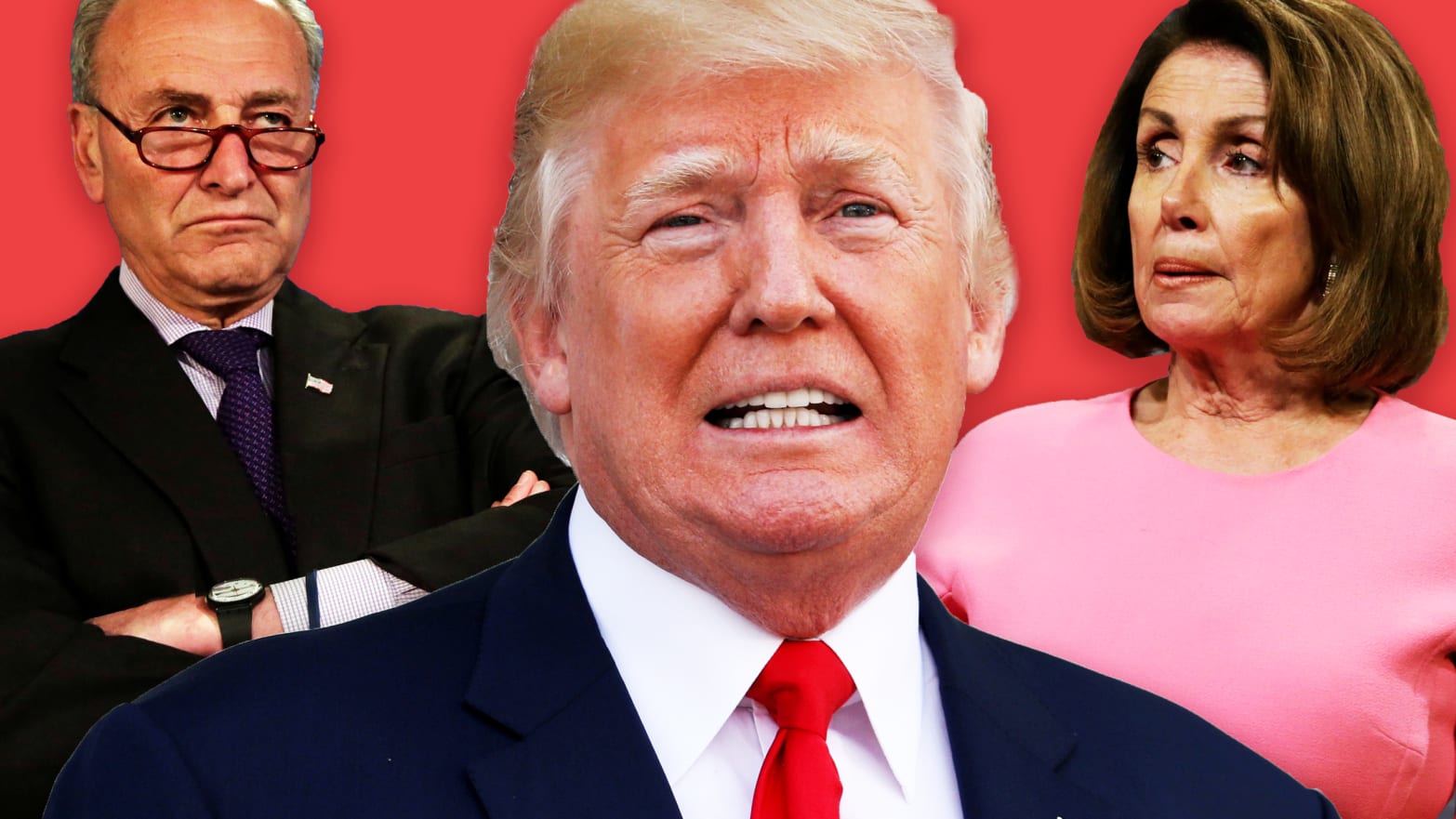An unfamiliar courtship has begun taking place between Donald Trump and leading congressional Democrats, with neither side entirely sure whether to trust the other or what good might come from their political dalliance.
On Wednesday evening, the president had dinner with Senate Minority Leader Chuck Schumer (D-NY) and House Minority Leader Nancy Pelosi (D-CA), during which a potentially major bit of immigration reform was agreed.
The two Democratic leaders said Trump pledged to sign a bill granting legal protections to DACA recipients in exchange for border security measures that did not include funding for his beloved wall. The White House disputed that characterization, saying Trump never agreed to exclude the wall. But a Democratic aide told The Daily Beast that the president had made it clear that “he would continue to fight for the wall separate from this agreement.”
Underlining the mutual distrust that still exists between the parties, the president and Pelosi and Schumer were still publicly releasing statements defining the contours of their conversation by the next morning. Trump sent a series of apparently contradictory pre-dawn Tweets on Thursday. He initially claimed “No deal was made last night on DACA,” but he then appeared to argue in favor of the exact deal the Democrats had been pushing.
Pelosi and Schumer replied with a statement insisting that “President Trump's Tweets are not inconsistent with the agreement reached last night."
These past couple of weeks have unnerved Republicans on Capitol Hill, due to the uncomfortable notion that this Republican president is, at least for now, getting too much of a kick out of snubbing the GOP and playing nice with Democrats.
On seeing reports Wednesday night of Trump’s deal with the Democrats, Rep. Steve King (R-IA) tweeted that if the news was true, the president’s base would be “blown up, destroyed, irreparable, and disillusioned beyond repair. No promise is credible.”
A Democratic aide said Schumer, Pelosi and Trump had discussed immigration and other matters while eating Chinese food—prepared by the White House kitchen—in the Blue Room of the White House. The first 30 minutes of the meeting were focused on China trade-related issues. Trump, the aide said, was seated at the head of the long rectangular table, with Pelosi to his right and Schumer to his left. There were a total of 11 people at the table; all men, save Pelosi.
It was also striking who did not make the invite list; House Speaker Paul Ryan (R-WI) and Senate Majority Leader Mitch McConnell (R-KY) were not in attendance.
Nearly nine months into a modern-day presidential administration, such outreach is not all that common. It was two years into President Barack Obama’s tenure before he held his first solo meeting with Republican leaders, and that came only after a humbling midterm defeat. Obama met with then Speaker John Boehner in December 2012, and the two would not meet face-to-face again until February 2014.
Then, as now, each side warily attempted to find areas of commonality in a hyper-partisan climate. Despite Trump hosting Schumer and Pelosi, it is not entirely clear that the two Democrats and the president share the same expectations for their newfound alliance.
Prior to the meeting, Democratic aides on Capitol Hill told The Daily Beast that leadership was hoping to push Trump into dual-prong deals: one that would grant legal protections to undocumented minors; and another that would shore up the health insurance markets that came into existence under Obamacare—markets that Trump has spent his presidency trying to undo.
“That’s what we’re pushing,” said one senior Democratic aide, listing cost-sharing payments and reinsurance provisions among the specific health care asks. “He probably thinks he will talk about tax reform.”
Indeed, that is precisely what the White House envisioned the meeting would be about. Administration officials said Trump planned to push Schumer and Pelosi to embrace his call for a tax system overhaul. And his plan was to pitch the proposal as far more equitable than has been publicly portrayed.
In a series of bipartisan meetings this week, Trump has insisted to attendees that his plan would not end up cutting taxes for the wealthy and that a drop in the marginal rate for the rich would be offset by the closure of loopholes that rich people often utilize.
“I think the wealthy will be pretty much where they are, pretty much where they are,” Trump said on Wednesday. “If they have to go higher, they’ll go higher.”
Whether a lasting agreement can emerge from these sessions remains to be seen. Not even a month ago, the likelihood of legislative commonality being found between congressional Democrats and the president seemed impossible.
But Trump has since cut a deal with Schumer and Pelosi on funding the government, raising the debt ceiling, and paying for hurricane recovery without spending cuts to offset those funds. And suddenly, talk has begun of Trump being an actual independent.
“It’s probably too early to reach a conclusion,” conceded former senator Joe Lieberman (I-CT), an actual independent, in an interview with The Daily Beast. “And I think President Trump may sort of vary. He may be independent on one thing, he may be Republican on another. He may even be Democratic on something.”
Lieberman, who has been relatively close to Trump, having been floated as his potential FBI director, noted the numerous conservative positions Trump has taken to date—from appointing Neil Gorsuch to the Supreme Court, to stripping down environmental regulations, to restricting transgender rights in the military.
But Lieberman added that the debt ceiling agreement “does give us some hope that he will retain the ability to put together coalitions of Democrats and Republicans to get things done in Washington. And he’s in a good position to do that because he’s not a traditional Republican. He’s not a traditional Democrat. He’s probably a little of each or some of each.”
Privately, administration officials have said the president has relished the positive press that his one major bipartisan deal produced and is eager for more. Publicly, his aides insist that this is about political realities, not cable ratings.
“Bipartisanship is a means, not an end,” counselor to the president Kellyanne Conway told The Daily Beast. “[Trump] welcomes support for his agenda. His ideas prevailed, he got elected, so no one should be surprised by his legislative priorities and policy expectations. Resist and obstruct has been ineffective.”
But it’s clear that Trump is, at a minimum, frustrated with the failure to produce legislative accomplishments so far in his tenure and eager for a course correction. Perhaps more important, his resentment toward leaders of his own party has yet to dissipate.
As The Daily Beast reported last week, when the president undercut fellow Republicans, including Ryan and McConnell, on the debt deal, he did so deliberately. He continues to hold grudges against top Republicans, whom he views as hostile, insufficiently loyal, and impotent. It was well-known within the White House that Trump, prior to cutting the debt ceiling deal, was “not looking to do [Ryan and McConnell] any favors,” as one White House official put it bluntly.
That level of animosity and mutual distrust has helped ensure that Trump would search for other partners, partly out of pragmatism, partly out of spite, partly out of an eagerness for some positive media chatter.
On Tuesday night, Trump held a bipartisan gathering of senators over to the White House to discuss tax reform. An aide to one of the senators in attendance relayed that Trump “felt very comfortable” in the setting, “more comfortable working on a bipartisan deal than anything else.”
That gathering did not include McConnell.
—with reporting by Gideon Resnick


